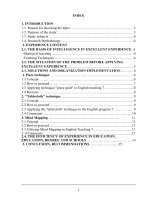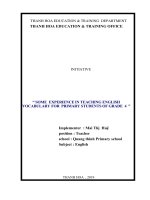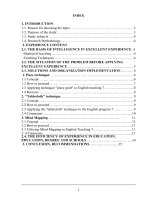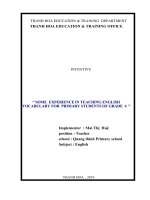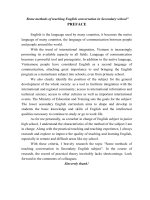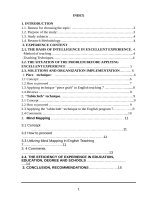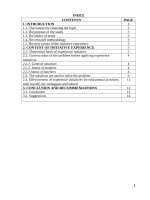(SKKN 2022) some tips for teaching english vocabulary at secondary school level
Bạn đang xem bản rút gọn của tài liệu. Xem và tải ngay bản đầy đủ của tài liệu tại đây (112.91 KB, 17 trang )
SỞ GIÁO DỤC VÀ ĐÀO TẠO THANH HỐ
PHỊNG GD&ĐT N ĐỊNH
SÁNG KIẾN KINH NGHIỆM
SOME TIPS FOR TEACHING ENGLISH VOCABULARY
AT SECONDARY SCHOOL LEVEL
Người thực hiện: Nguyễn Thị Định
Chức vụ: Giáo viên
Đơn vị công tác: Trường THCS Yên Lạc
SKKN thuộc lĩnh mực (mơn): Tiếng Anh
THANH HỐ NĂM 2022
2
3
TABLE OF CONTENTS
I. INTRODUCTION
1. Reasons for choosing topics
2. Research purpose
3. Research object scope
4. Research tasks
5. Research method
6.Content of the topic
II. CONTENT
CHAPTER I:Theoretical background related to the research topic
1. Legal basis
2. Theoretical basis
3.Practical basis
CHAPTER II: Status of the research topic
1. Overview of research scope and area
2. Current status of the research topic
3. Causes of the situation
CHAPTER III: Main measures and solutions to implement the topic
1. Basis for proposed solutions
2. Main solutions
3. Organizing and implementing
III. CONCLUSIONS AND RECOMMENDATIONS
1. Conclusion
2. Recommendations
1
1
1
2
2
2
2
3
3
3
4
5
5
5
5
6
6
6
6
7
12
12
13
4
I. INTRODUCTION
1. Reason for choosing the topic:
Today in modern society is rapidly changing with the explosion of
information, science, technology, and technology developing like a storm. To meet
the needs of socio-economic development and global integration, proficient use of
English in communication plays a very important role. Currently, over two-thirds
of countries in the world use it. English and consider it as a tool of communication,
exchange, cultural exchange and commerce.
Over a period of time, the content reform and the textbook program have
initially brought encouraging results. The teaching and learning of English in high
schools has undergone major changes in content as well as teaching methods to
match the goals and requirements set forth for this subject in the reform program.
The most basic view of the new method is how to promote the positivity, initiative
and creativity of learners and create optimal conditions for learners to practice and
develop their ability to use language for communication purposes. rather than
simply providing knowledge. With the requirement of teaching English at
secondary school level according to a new method (Communication perspective)
and helping students develop 4 basic skills Listening - Speaking - Reading Writing. In order to implement those skills, I realize that it is necessary to find a
few measures to promote the active learning of students to help them be interested
in learning the subject, the teaching of vocabulary plays a very important role.
important, because vocabulary is the building block of the language house. How to
keep students interested in English lessons, using English words for a long time
and fluently, in the right context, with correct pronunciation, this is a question that
I always ponder. It is for the above reasons that I have chosen the topic "Some tips
for teaching English vocabulary at secondary school level."
2 . Research purpose
In order to innovate new methods of teaching materials, avoid boring
repetition, create excitement for students in English class, they can both learn and
play, while at the same time inculcating the knowledge that other teachers have
learned. I have just learned, mastered the knowledge, pronounce correctly and
remember words for a long time, use the language fluently in communication and
enjoy learning English.
Help teachers save time teaching materials in class, spend more time on
practice.
5
3. Research object and scope
The target audience is students in grades 6-7-8-9.
Research within the English curriculum at the lower secondary level
according to the themes of the unit of study.
4. Research tasks:
- The role of new language teaching skills in the process of teaching and
learning English.
- Skills of introducing and checking corpus.
- Results of using skills.
5. Research method
Research Methods
Studying the program, collecting references related to vocabulary teaching
tips, drawing out some experiences in teaching new corpus, finding out the
difficulties and obstacles in the process of teaching new corpus teachers and
students' knowledge to find ways to overcome them.
- Observational method: Watch time, observe the teaching process of
colleagues and the learning of students in class to find the most optimal solutions
to improve the quality of English teaching and learning in junior high schools
today.
- Communication practice method: HowOrganize classes through
speaking and writing practice skills.
- Synthetic method : Find out the characteristics of students to see what they
lack in order to achieve the most optimal goals, classify their language levelHe
input students, divide classes by level, and allocate time and design lessons
appropriately.
6. Content of the topic
Some tips for teaching middle school English vocabulary
II.TOPIC CONTENT :
CHAPTER I: Theoretical background related to the research topic
1. Legal basis
The Education Law 2005 (Article 5) stipulates: “Educational methods
promote positivity, self-discipline, initiative and creative thinking of learners;
foster learners' self-study ability, practical ability, passion for learning and the will
to rise.
With the goal of general education is "to help students develop
comprehensively in morality, intelligence, physical, aesthetic and basic skills,
develop personal capacity, dynamism and creativity to form Socialist Vietnam's
human personality, building citizenship status and responsibilities; prepare students
to continue studying and going into working life, participating in the construction
and defense of the country”; The general education program of the Minister of
Education and Training also stated: “The positivity, self-discipline, initiative and
creativity of students must be promoted; suitable to the characteristics of the
6
subject, the characteristics of the students, the conditions of each class; foster
students' self-study methods, the ability to cooperate; practice skills to apply
knowledge in practice; affect the emotions that bring joy, excitement and
responsibility to students' learning. Based on the theme of the 2021-2022 school
year "Continuing innovating management and improving the quality of education"
, based on the following plan . The 2021-20122 school year plan of the Department
of Education and Training of Thanh Hoa, of the Department of Education and
Training of the Yen Dinh district aims to innovate teaching methods, teaching
according to knowledge and skills standards, in a positive direction, improving
high quality education.
2. Theoretical basis
In any language, the role of teaching vocabulary is also very important. A
language can be seen as a collection of words. It is not possible to understand
language without knowing the vocabulary, or through the lexical units. But that
does not mean that we can only understand individual, independent lexical units,
but only master the language through the dialectical relationship between lexical
units. Thus, learning vocabulary and practicing vocabulary skills is the leading
factor in the transmission and acquisition of a language in general and English in
particular.
Since vocabulary is a language unit, it is expressed in two forms: Speech and
writing. To be able to use that language, it is necessary to master the form of
expression of words in oral and written form. But due to the relationship of
vocabulary with other elements in the language: grammar, phonetics, intonation...
or in specific communication situations, we see that vocabulary is the "bricks" and
the language French language and other linguistic elements are considered as
"mortar circuits" to build a language house.
a. The concept of the subject's role
This topic plays a very important role in innovating teaching methods in the
direction of promoting the activeness, initiative and creativity of students in
learning activities, in order to create the ability to recognize and solve problems.
your topic. To contribute to this goal, it is necessary to use vocabulary teaching
techniques for students instead of traditional teaching (the teacher provides words
and semantics).
b. The concept of the topic position
This topic helps teachers approach this methodFrancerealcommunicate
easily . Vocabulary is only a small component in a sentence, but vocabulary is an
indispensable means of practice and communication. To be able to communicate in
English requires students not only to practice skills, but also to learn vocabulary
and to have a certain vocabulary.
c. The concept of the task
This topic is to study techniques to teach vocabulary to students in
secondary schools. The tips in this topic will help teachers save time when
teaching theory and at the same time use and exploit teaching aids more
effectively, creating learning excitement for students and help them remember
7
words quickly, make the lesson more lively, attractive and attractive to students.
3. Practical basis :
Currently, in high schools, like other subjects, English teaching and learning
is taking place along with the innovation of educational methods, reform of
textbooks, and reduction of curriculum content in order to improve the quality of
life. suitable to students' perception, making students have access to modern
content and knowledge. English vocabulary in the curriculum is also used in
accordance with the general development of society.
First of all, starting from the object of teaching are students aged 12-16, with
little life experience and limited social understanding, so the vocabulary taught at
this level often has to be are combined with appropriate teaching skills to arouse
interest and interest in students. Besides, teaching and learning English in school
also takes place in a communication environment of teachers and students with
many limitations: Teaching medicine in a large group (usually a class unit with
about 30 students). or more), cognitive levels have many different levels, (except
for selected classes) teaching aids are not synchronized. These things distract
students' focus, greatly affect the skill training of students, slow down the process
of absorbing knowledge of students and allocating time for each part of the lesson
content. suitable for each type of lecture (practice, skill) is also an impact on the
appropriate selection, research and application of vocabulary teaching skills.
Through my teaching practice over the years, I have noticed that the old
method of teaching vocabulary is usually done in the following way: The teacher
(teacher) reads the lesson and then lists the words, according to the teacher, he has
never appeared in the past. the teaching process is new words; Then the teacher
explains the meaning, usage of words, and types of words to students. It has the
following basic limitations: Making students passive in enriching their own
vocabulary, using words in limited, inflexible communication contexts and often
depending on grammatical structures.
Since then, the problem posed here is the study and application of
vocabulary teaching skills, specifically the skills of introducing and testing
vocabulary to students in an appropriate and effective manner.
CHAPTER II :Status of the research topic
1. Overview of research scope and area
The scope of research on techniques for teaching English vocabulary at
secondary school level.
2. Current status of the research topic
Currently, the teacher's vocabulary teaching still has many shortcomings. In
a foreign language class, the teacher spends too much time on teaching vocabulary
and does not have time for students to practice. In addition, the number of words is
too much, usually more than 10 words in a class, the vocabulary teaching tricks are
still boring, not diverse and not really attractive to students, making them difficult
to learn. Students feel that learning English is crammed with knowledge and very
bored.
The students have not really grasped how to learn vocabulary, so during the
8
lesson, they tend to focus on finding the meaning of new words and pay little
attention to the content of the lesson.
3. Causes of the situation
In the process of preparing lectures, teachers have not invested much, have
not yet determined which words are active words, which words are passive words,
have not yet grasped the vocabulary teaching tips, the lesson design is still long,
some Teachers are still influenced by the Grammar translation method, not paying
much attention to the communication skills Listening-Speaking-Reading-Writing.
The students still depend too much on the reference book "To learn English
well 6,7,8,9" , when they come to class, they bring only one answer to the teacher's
question correctly. Thus, learning English is only coping.
Some children have difficult family conditions, cannot afford to buy
reference books, dictionaries, newspapers, magazines and other documents in
English….to study at home.
CHAPTER III: Main measures and solutions to implement the topic
1. Basis for proposed solutions
- Teaching and testing and assessing students' learning results according to
the standards of knowledge and skills of the English program at secondary school
level.
2. Main solutions
- Vocabulary teaching techniques are applied in all teaching processes. From
vocabulary introduction, speaking and writing practice, reinforcement practice to
even a warm-up to create an exciting class from the very beginning of a class.
- The use of vocabulary teaching tricks in the process of teaching English is
aimed at making students have a complete vocabulary, serving the language
learning process, grasping the meaning and usage of words in the English
language. communication process.
- Different word teaching tricks will make students feel interested in the
subject, memorize vocabulary with communication context, improve self-study
ability, students will enrich their own vocabulary and self Check your word usage.
Students will be active in communication situations as well as absorbing new
knowledge.
- Teachers must know how to choose words to teach, in order to choose
words to teach, it is necessary to consider the problems of active and passive
vocabulary.
+ Active vocabulary: Are words that students only understand and recognize
and use in oral and written communication.
+ Passive vocabulary: These are words that students only understand and
recognize when listening and reading.
- Before designing a lesson, you must carefully read the content of the
lesson, it is necessary to choose the right words to teach (about 6-8 words per
9
lesson) equivalent to those words, then the teacher needs to prepare teaching aids.
What to learn and how to design exercises appropriately, choose appropriate tricks
to bring high efficiency, anticipate possible situations, words that you can guess are
not necessary. teach.
- Teachers need to master the steps of teaching a new word, not skipping the
word stress, avoiding the monotonous introduction of writing the word on the
board without any narration.
3. Organizing and implementing
a. Steps to introduce vocabulary
The first stage in teaching vocabulary is the introduction of new words to
students. Introducing new words plays a very important role in an English lesson.
It can help students understand the content of the lesson, understand the meaning
of words, and use them through the teacher's initial introduction. Normally, to
introduce a new word, teachers usually take the following steps:
- Suggesting words to teach with pictures, real objects, examples,
situations...
- Introduction of words taught in English;
- Let students listen 3 times;
- Students repeat new words (2-3 times in unison);
- Students repeat individually (2-3 students);
- The teacher presents the word on the board;
- Check word meanings in Vietnamese;
- Check word stress;
- When teaching all new words, students write in notebooks.
However, not every new word that appears during the lecture to students is
included in the introduction of new words. The teacher must know how to choose,
identify positive words, take the initiative to teach and try to promote students'
self-learning ability for negative words. Besides, teachers also have to know how
to arrange the words that will be taught in the lesson in a reasonable order, or
create open suggestions according to the topic of the lesson.
Example 1 . UNIT 1: LESSON 4: READING (GRADE 8)
Teaching vocabulary consists of 8 words.
- Character
(n): Personality
- Sociable
(a) : Open -minded
- Volunteer
(n) : Volunteer
- Orphanage
(n) : Orphanage
- Reserved
(a): Discreet
- Public
(n) : Crowd
- Sense of humor
(n): Humor.
- Tell jokes
(v): Tell jokes.
Teachers only need to introduce 5 words: character, orphanage, reserved,
sociable, tell jokes. There are 3 words left: public, volunteer, sence of humor for
students to actively learn during the reading process, and with 5 new words to
teach, teachers should arrange them in the order of teaching.
10
1. orphanage
2. character
3. sociable
4. reserved
5. tell jokes.
With a specific quote as follows:
Introduction from orphanage teachers can say “It's a place where childen
without parents live”. Students will immediately understand what the word is
about. Continuing the steps of the word introduction sequence, the teacher might
ask the students “How do we say personality in English?” Students can answer
“character” if they know or “We don't know” if they do not. In this case the teacher
can always say: character means character in English. The teacher continued: What
is the personality of a person who is active, easy to get along with strangers,
communicates widely? – Students can answer the word open (introduced the word
sociable). The teacher continued: What is the opposite of openness? – Students can
answer the word discreet, quiet (introduced the word reserved). What is your
classmate's story that makes the whole class laugh? – Students can answer the
word tell jokes (introduce the word tell jokes).
Example 2.UNIT 2: LESSON 2: SPEAK (GRADE 9)
Teaching vocabulary consists of 6 words in sequence :
- Short sleeve blouse (n)
- Sleeveless
(a): Without sleeves (shirt)
- Faded (a): Silver color
- Plain
(a): Smooth, no pattern
- Plaid
(a): Checkered
- Baggy (a): Baggy.
Introduce the word “short-sleeved blouse” and the word “faded” the teacher
can use real objects, introduce the word “plaid” the teacher can draw on the board,
introduce the words “plain”, “baggy”, and “sleeveless” “Teachers can use pictures.
Example 3.UNIT 9: LESON 1: LISTEN AND READ. (GRADE 8)
Teaching vocabulary consists of 4 words, arranged in sequence.
- ambulance
(n): ambulance
- emergency
(n): emergency case
- unconcious
(n): unconscious
- bleed
(v): bleed
With a specific quote as follows:
The teacher shows the students a picture and asks “what's this?”. Students
answer: Ambulance. Teacher says: ambulance means ambulance in English.
(referral from ambulance).Teacher asks: When do we need an ambulance. Students
answer: When there is an emergency (referred from emergency). How to say
"sober" in English? – Concious – Do you know what the opposite word for
“concious” is? (introduced from unconcious). - What happens when we are cut in
the hand? – bleeding (introduced from bleed).
Example 4: UNIT5 B1,2 (grade7) (Teaching vocabulary consists of 6 words)
-recess
11
- bell,
-to play blindman's bluff
-to play catch
-to play marbles
-to skip rope
With recess, teachers can use synonyms break, bell: assign real objects,
while the rest use pictures.
In addition to arranging and arranging vocabulary words to teach teachers,
teachers also have to use skills to introduce new words, creating attraction for
students through skills of introducing words. We also know that the amount of time
to introduce vocabulary in a class takes a small part, only from 5 to 7 minutes (and
a maximum of 10 minutes), so when introducing words, teachers must make the
lead so real. clear, specific, simple and fast. Teachers must choose appropriate
word introduction skills, both to attract students' attention and to help students
memorize vocabulary at an early stage.
With examples 1, 2, 3 and 4 just mentioned above, we see a lesson that
teaches teachers to use many different skills to introduce words.
Example 1: Introduce the word through
- Suggestion (Elicitation): orphanage
- Translation : character
- Situation: sociable
- Antonym: reserved
- Real things as an example: (Example) : tell jokes
Example 2: Introducing the word through
Real thing: Short - sleeved blouse, faded
- Drawing (Drawing/Picture) : plaid
- Picture (Picture)
: plain, baggy, sleeveless.
Example 3: Introduce the word through
- Picture: ambulance. To play marbles ,to skip rope…
- Situation: emergency, bleed
- Antonym: unconcious.
-Synonym (Synonym): break , to chat
The skill of introducing words is very rich, but how to use them, when to use
them and for what purpose is a problem that requires teachers to think and apply
flexibly to achieve the teaching purpose.
b. Tips for introducing new words
1 Introduce vocabulary through visual widgets . (visuals)
+ Real thing: (Real thing) Example: - bulb/water bill (unit 7- grade9)
- doll (unit 9 – grade 9)
+ Picture: (Picture): Example: - eye chart/wheel chair (unit 9)
- graze (unit 4 – grade 8)
With the new textbooks for grades 7, 8 and 9 now with many beautiful
pictures, teachers can take advantage of this to introduce vocabulary to students.
2. Introduce words through teacher's actions.(mime/guesture)
Example: Wrap/mix/press (unit 10)
12
Come in / sit down /open/ close /Brush teeth/get dress (grade 6)
3. Introduce words through context: (situation/explanation)
Help students understand how to use the learned words and use them
correctly in each communication situation.
Example: award (unit 13); guarantee (unit 14) grade 8
Control (unit 5); innovation (unit 7) grade 9
4. Introduce words through synonyms and antonyms. (synonym/antonym)
It is a combination of both introducing new words and practicing the words
taught.
Example: noisy >< quiet (unit8) different >< same.
5. Introduce words through examples. (example)
This skill helps students have a set of words by topic.
Eg:
Chores: do the washing up, sweep the floor, cook, tidy up, make the bed....
Subjects: math, history, english.......
6. Introduce words by means of translation. (translation)
This skill helps teachers introduce words in a concise manner, without
wasting time, especially with words with abstract meanings.
Example: demonstrate (unit 2) ; contact (unit 10)
Behavior (unit 5); deposit (unit 10)
In short: Using vocabulary introduction skills is to find the closest and
easiest way to approach students' knowledge acquisition, help students acquire
knowledge faster, and enjoy the lesson. learn more. And to achieve high efficiency
in the introduction of vocabulary, in addition to choosing the right skills to
introduce words, teachers also have to perform the pronunciation of words in a
standard way, and present the words correctly and clearly. on the board so that
students can recognize the word being taught from every objective angle.
c. Simple vocabulary test tips
Checking students' vocabulary is also an important part of the teaching
process. It determines how well students grasp the word. Testing usually takes
place under two levels; Simple and complete.
A simple test is an individual vocabulary test, testing immediately after
completing a vocabulary introduction. Test activities in each lesson are often
presented by teachers in the form of games that make students excited and
enthusiastic about the lesson, and stimulate competition in learning. We can use
some tricks to check vocabulary just learned in class such as:
- Rub out and remember: Delete the word introduced on the board and ask
students to recreate it on the board
- Slap the board: Write the words you just introduced or paste pictures
showing the words on the board. Ask students to tap the word or picture when the
teacher reads the word (words on the board in English are read in Vietnamese and
vice versa).
- What and Where: Write the newly introduced word in the circles on the
board, let students read and erase the words, then ask students to rewrite the word
in its old position.
13
- Jumbled words: Teacher writes words with jumbled letters, then asks
students to rewrite the word correctly.
- Word square: The teacher prepares a crossword containing the introduced
words, asking students to circle the words they found.
- Networks: Students write a network of words by topic
- Bingo: Students choose 5 words from the words suggested by the teacher
on the board, after listening to the teacher read, if any student can hear the first 5
words, then shout "bingo"
- Guessing game: A student writes a word on a piece of paper or uses word
pictures, then uses other words to describe and express that word for other students
to guess.
- Matching: In one column the teacher writes the word, and the second
column writes the concept or definition out of the order of the first column, then
asks students to match the words with their concepts or definitions.
- Ordering: The teacher asks the students to write the words in their
notebooks, then the teacher reads a short passage containing those words, the
students listen and mark the order of the words according to the reading order.
Test tricks are performed at different teaching hours to create something new
and not boring for students. On the other hand, we also need to pay attention to
student status, or how fast or slow a student's perception is to ensure that testing is
done regularly and with all students. For good students, quickly absorbing teachers
using skills that often require students to recreate the part they have learned such
as; Rub out and remember, slap the board, what and where, networks ... For
students who are weak and slow to absorb, use test methods that are suggestive of
words such as jumbled words, wordsquare, matching, ordering . ..
d. Complete vocabulary test tips
Besides simple testing tricks, there are also complete testing tricks. The
completion test is done after the vocabulary is practiced, reviewed and
consolidated in the speaking and writing practice hours, listening, reading and
writing practice hours. This type of test usually takes the form of a spoken or
written test. Teachers can do it right in the "warm up" part of the lesson or in the
form of an old lesson test, a 15-minute test, a 45-minute test or a semester test.
Eg:
- Gap fill: Students fill in the blanks to complete a sentence or a paragraph.
- Choose the best anwser: Students choose the best answer from the
suggested answers.
- Put words in the right order: Students arrange the shuffled words into
complete sentences.
- Write sentence from the words given: Students write sentences from the
suggested words.
- Chain game: Students work in groups, the latter add ideas to the previous
sentence.
- Dictation: Students listen and copy the dictation.
- Nought and crosses: Students perform a vocabulary test in the form of
communication practice sentences.
14
- Pyramid: Students write sentences by topic in the form of organization
from individuals to small groups, large groups to gradually complement each
other's ideas.
- The purpose of this completion test is to check whether students understand
and use words correctly in specific communication situations, and besides, to help
students build a complete vocabulary and In abundance, testing can be done
according to specific requirements or aggregated in a 45-minute test or a semester
test.
- Listening test: Gap fill, Choose the best answer, dictation.
- Speaking test: Chain game, nought and crosses
- Reading test: Gap fill, choose the best answer.
- Writing test: Put words in the right order, write sentence from the words
given, pyramid.
In the process of teaching English, the introduction and test of vocabulary,
although not taking up much time, play a very important role, creating a premise
for students to master and use the language correctly later. The teacher as a guide
must use appropriate tricks in the process of introducing vocabulary to achieve the
purpose of the lesson. In the process of composing
In the lesson, the teacher must choose the appropriate skills and techniques,
carefully prepare the word suggestions, the necessary items related to the word
introduction, and choose the appropriate way to check the words. interesting for
students , help students remember long and deeply understand the lesson.
III. CONCLUSIONS AND RECOMMENDATIONS
1. Conclusion
Over a period of time, the application of the above new methods of teaching
vocabulary in practice in the first classes has yielded certain results.
a. For students
- Most students master vocabulary and practice speaking or communicating
- The children are very active in class, their activities are self-disciplined, the
class is comfortable, they have more interest in the subject, they learn more words
and remember them longer, their thinking ability They also make better progress.
- Because of the vocabulary, the communication is also more advanced and
more confident, not timid and not afraid of mispronouncing anymore. They have
been able to put vocabulary into communication to create a lively, positive and
effective atmosphere in class and through periodic tests, they have achieved high
results.
b. For teachers
- These vocabulary teaching tips help teachers save time in the introduction
of corpus, the vocabulary is not overloaded for students, and spend more time on
practicing speaking and writing skills. . The time allotted for parts in a lesson is
guaranteed.
- The introduction, test and review tips from most of the design are in the
form of language games, so the classroom atmosphere is less stressful, making the
lesson more engaging and effective.
- Through the above tips, the teacher's introduction and word test is also
15
more closely related in many forms. Help students grasp new words more quickly
and effectively while overcoming the disadvantages of the traditional grammartranslation method.
2. Recommendations
- Increase investment in equipment and reference materials to serve the
teaching and learning of English.
- Every year it is necessary to add new pictures suitable to the content and
program; increase the purchase of equipment such as cassette players, new tapes
with accurate content and quality to ensure the highest efficiency in teaching and
learning.
- Organize extracurricular activities in English subject at least one
extracurricular activity/semester in various forms such as clubs, quizzes to learn,
writing newspaper, ... To create excitement as well as create a useful playground
for students in foreign language learning.
HEADMASTER’S CONFIRMATION
Yen Lac, April 15th, 2022
I swear this is my own writing, did not
copy other people's contents
The person performing
Nguyễn Thị Định
XÁC NHẬN CỦA HỘI ĐỒNG KHOA HỌC NGÀNH
16
REFERENCES
1. Nguyen Van Loi, English Textbook 7- Education Publishing House
2. Ministry of Education and Training, Regular training materials for
secondary school teachers cycle II
3. Ministry of Education and Training, Innovating teaching methods and
innovating English language test for students in Secondary School - 2008
4. Hoang Van Van (editor) - Innovating English teaching method - Home
Publishing Education
5.Translate to foster and improve English teaching techniques for the 2020-2021
school year
17
DANH MỤC
CÁC ĐỀ TÀI SÁNG KIẾN KINH NGHIỆM ĐÃ ĐƯỢC HỘI ĐỒNG ĐÁNH
GIÁ XẾP LOẠI CẤP PHÒNG GD & ĐT, CẤP SỞ GD & ĐT VÀ CÁC CẤP
CAO HƠN XẾP LOẠI TỪ C TRỞ LÊN
Họ và tên tác giả: Nguyễn Thị Định
Chức vụ và đơn vị công tác: Giáo viên trường THCS Yên Lạc
Kết quả
Cấp đánh giá
đánh giá
TT
Tên đề tài SKKN
xếp loại(Phòng,
xếp loại
Sở, Tỉnh...
(A, B hoặc
C)
Phương pháp gây hứng thú cho
Phòng GD &
1 học sinh trong giảng dạy ngoại
A
ĐT Yên Định
ngữ.
Các phương pháp phát huy tích
Phịng GD &
2 tích cực học tập của học sinh
C
ĐT Yên Định
trong giờ học ngoại ngữ
Phương pháp dạy kĩ năng nói
Phịng GD &
3
B
mơn Tiếng Anh THCS
ĐT n Định
Các phương pháp phát huy tích
Phịng GD &
4 tích cực học tập của học sinh
B
ĐT Yên Định
trong giờ học ngoại ngữ
Reproducing teaching methods Phòng GD &
5
C
through activity effective team ĐT Yên Định
The method of teaching well a
Phòng GD &
6 lesson of reading English class
C
ĐT Yên Định
8-9
Developing effectively english
Phòng GD &
7 speaking skill for students in
C
ĐT Yên Định
grade 6,7
Năm học
đánh giá
xếp loại
2005-2006
2007-2008
2008-2009
2010-2011
2017-2018
2019-2020
2020-2021


